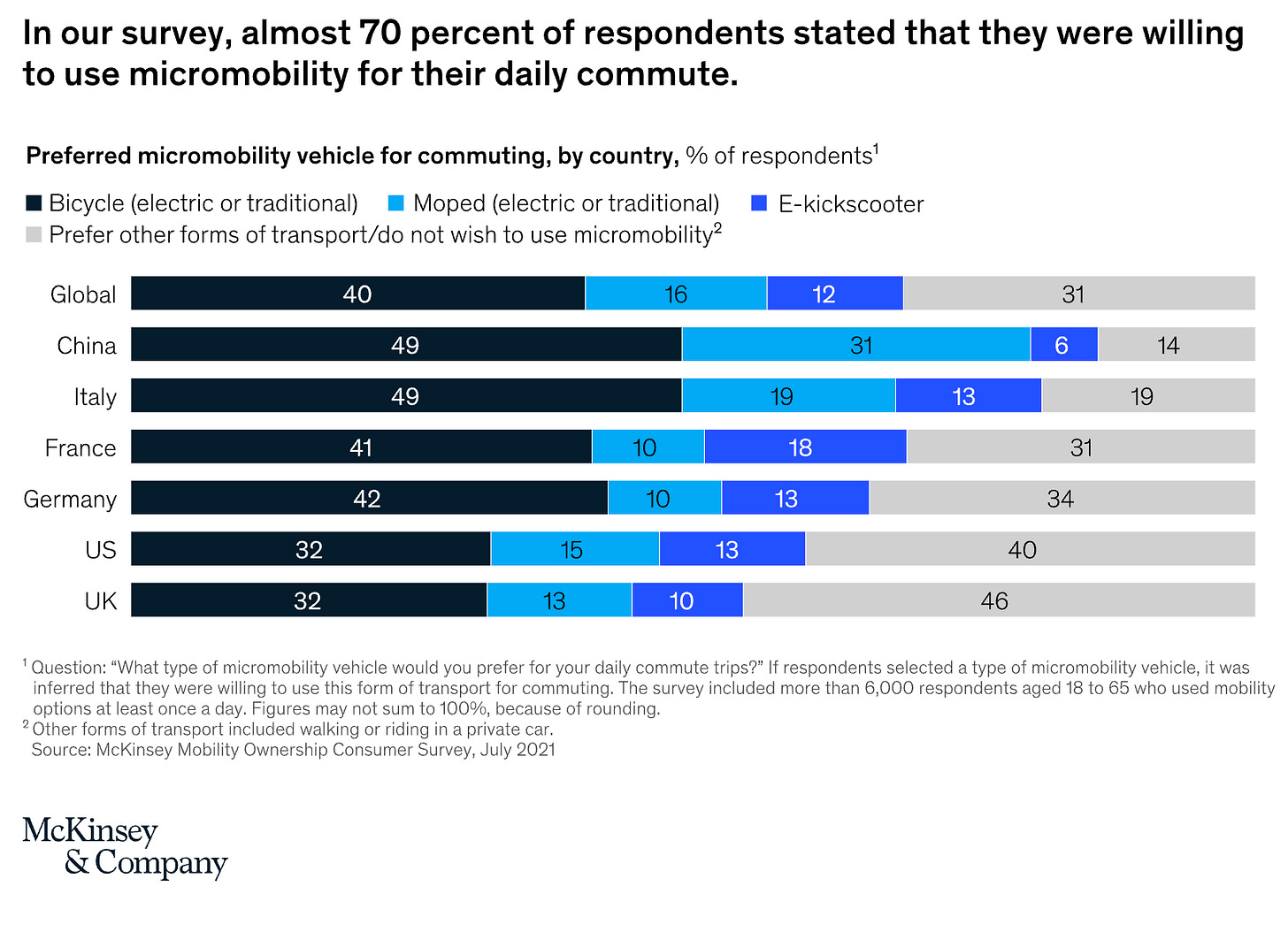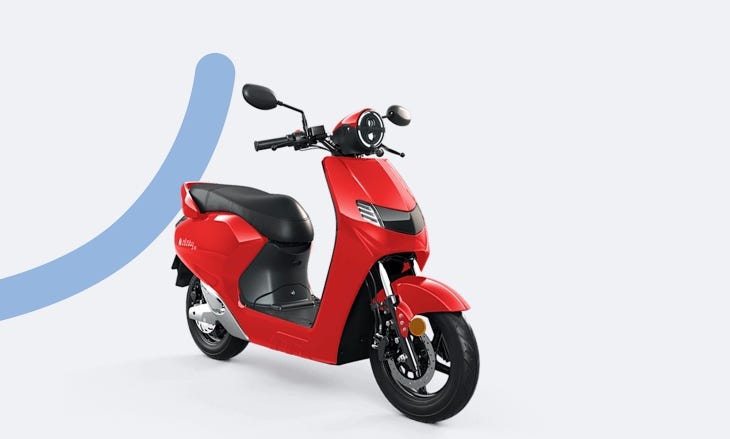🌎 70% of World Wants to Bike or Scoot to Work
Plus, Tesla builds an ATV for kids, $GRAB goes public, and Amazon is bringing the holidays to NYC by bike.
Hello and welcome to the Micromobility Newsletter, a weekly missive about mobility, mostly mobility in cities by small electric vehicles, such as hoverboards, ebikes, scooters, and mopeds. The reason you’re reading this email is that you signed up on our website or came to one of our events.
If you’re not a subscriber and you want to keep getting the latest news and analysis from inside the micromobility movement delivered straight to your inbox every Tuesday, sign up here for free. If you’d like to unsubscribe, just click that link.
Thank you for reading.
What You Need to Know This Week
US lawmakers are considering creating a 30% tax credit for up to $3,000 spent on a new ebike (excluding ebikes that are priced higher than $4,000). As it would just so happen, those prices are right in the sweet spot for a growing number of consumers. “Almost 60 percent of bikes sold in the 12-month period ended in September cost either less than $500 or more than $3,500. The fastest growth, however, is happening in the middle: Unit sales of bikes between $1,500 and $2,000 grew at a rate of 176% over the previous 12 months in that same span.”
If you order something on Amazon in New York City this holiday season, there’s a pretty good chance it will come to you on a bike. Photos from one of the ecom giant’s Manhattan distribution centers show a sea of two-wheelers loading up on packages. What if, in the future, shopping online is seen as detriment to local businesses, but a booster for local cycling infrastructure?
Of course, micromobility not only helps goods flow to people, it also helps people flow to goods. According to Bird, its riders spent a whopping $100M at local shops and restaurants in 2021.
If you could ride a bicycle, moped, or e-kickscooter to work, would you? According to McKinsey, the vast majority of people worldwide—nearly 70%—say yes. The data shows that demand for small vehicles is sky high. All that remains to be done is to make micromobility safe and accessible to more people in more cities. How could you not be insanely bullish?
Southeast Asian super app Grab, which does everything from ridehail to food delivery to financial services, went public in the US via a SPAC merger on Thursday. $GRAB is currently down ~33% from its opening price.
Food-delivery behemoth DoorDash is launching a service in New York City that promises to get groceries to customers in 15 mins or less.
Meanwhile, online grocery native Jokr raised $260M at a $1.2B valuation. You could buy a lot of ebikes and scooters with that kind of dough.
Online grocery startups get flak for catering millennials and zoomers who are supposedly too lazy to go shopping, but at their best, these services can help optimize people’s time and increase access to fresh food. For example, a new startup called Farmstead is bringing online grocery to food-stamp recipients, who would otherwise have to spend time and money to get to the supermarket to feed their families.


Milan announced it is investing €250M in its new Urban Biking Strategy, including fast cycle corridors with better public transit integration. If that figure sounds familiar, it may be because Paris poured the exact same amount of money into its own cycling budget earlier this year. Let it be known, European cities are not messing around when it comes to bike policy. (ht Ruffino Paolo)
Meanwhile, Berlin is transforming into quite the micromobility mecca. More people bike in the German capital than in Paris, London, Madrid, and Rome combined, and the city has more shared mobility vehicles (+50,000) available than any other municipality in Europe.
America’s shortage of bus drivers is approaching crisis levels.
Tesla’s first foray into the world of EVs that weigh less than one ton is here and it’s a $1,900 Cybertruck-style ATV for kids called Cyberquad. Naturally, it’s already sold out.
New York City’s bikeshare system, Citi Bike, became so popular during the pandemic, riders complain they can’t find open docks to park their bikes.
The “greenfield concept” of smart cities—in which a new high-tech metropolis is designed completely from scratch, without any preexisting history, community, or culture—has fallen out of favor in urbanist circles.
San Francisco made its pandemic-era parklets permanent, but added so many rules that restaurants plan to tear them down anyway.
While biking is easy to learn, the physics behind it are truly mind-bending, as this video illustrates.
Delivery robots break down in the Estonian winter, causing what may be the first recorded instance of a traffic jam of sidewalk delivery vehicles.
Related: Segway, which has produced e-scooters for nearly every shared micromobility operator at one point or another, is making its first foray into sidewalk delivery bots via a partnership with Coco.
Here are some nice infographics illustrating the extent of the current ebike boom in the US. 130% growth YoY, not too bad.
And here is a breakdown of Europe’s ebike funding landscape.
Remember the infamous Chinese bike mountains? Today they’re a thing of the past, and China’s bikeshare industry has never been healthier. “Ofo and Mobike’s missteps, however serious, did not kill the bike rental industry in China. If anything, in the aftermath of the bicycle wars, the industry seems increasingly stable, with firms like Qingju, Meituan, and Hello carving up the market. According to a 2020 report issued by data agency EqualOcean, these three companies have entered a combined 400 cities and have tens of millions of monthly active users.”
Better bike policy could save 15,000 lives per year in the US, not just by preventing collisions, but also by reducing air pollution, increasing physical activity, and more.
Luna, an Irish computer vision startup, created a demo of its new “AI parking selfie” technology, an app-based solution that allows shared micromobility operators to verify parking compliance via photo.
India’s EV moped war is really heating up. Bangalore-based Bounce priced its first electric moped, the Infinity E1, at as low as $480, significantly undercutting its rival Ola, whose own line starts at $1,350.
Argo AI, an autonomous driving technology company, teamed up with the advocacy group League of American Cyclists to come up with a set of guidelines for how self-driving vehicles should identify and interact with cyclists.
Road rage incidents are spiking across the US.
Did you know a single Hummer EV battery could power the equivalent of 400 ebikes? (ht Matt Frommer)
Meet Micromobility DAO - a new Decentralized Autonomous Organization in which members control a public fund and vote on different proposals to promote the use of micromobility. “Imagine a public fund that raised billions of dollars from individuals, organizations, companies, NGO’s, transit agencies, government, and billionaires. And the interest earned on the money in the fund is allocated via the submission of proposals and voted on by everyone participating in the DAO… What can be done with the money? Well it’s up for the group to decide but here are a few ideas: Free micromobility for everyone. Yes, $0 cost to ride.”
Jobs to Be Done
Welcome to our jobs board, where every week we post open positions in hopes of connecting our talented readers with professional opportunities in the burgeoning world of new mobility. Find out who’s hiring below and sign up for the newsletter to view fresh listings every week.
Hit reply if you have a job that you’re interested in listing.
Culdesac:
People & Operations Generalist (Tempe)
Real Estate Finance Analyst (remote or Tempe/Dallas)
Senior Software Engineer (remote or Tempe/San Francisco)
Dance (all jobs in Berlin unless otherwise noted)
Regional Program Director @ Tranzito (Los Angeles)
Projects and Delivery Manager (Scotland) @ CoMoUK






